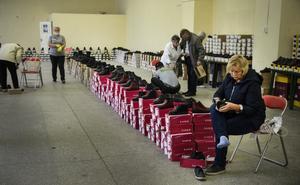 People buy shoes in a shop in the Siberian city of Tomsk on Sept 8, 2020. (ALEXANDER NEMENOV / AFP)
People buy shoes in a shop in the Siberian city of Tomsk on Sept 8, 2020. (ALEXANDER NEMENOV / AFP)
GENEVA / CAIRO / BUENOS AIRES / MEXICO CITY / SAO PAULO / ATHENS / LONDON / MADRID / BERLIN / MOSCOW / KIEV / ABUJA - Siberia’s Vector virology institute on Tuesday completed early-stage human trials, known as Phase II, of a second potential Russian vaccine against COVID-19, the state consumer safety watchdog was cited by the Interfax news agency as saying.
Russia registered its first vaccine candidate, developed by Moscow’s Gamaleya Institute, in August. Late-stage trials of this vaccine, due to involve 40,000 participants, were launched last week.
Human trials of the second potential COVID-19 vaccine, a peptide-based jab, began on July 27 and involved a group of 100 volunteers, Interfax cited watchdog Rospotrebnadzor as saying.
Results are due to be published on Sept 30, Interfax said.
Russia reported 5,099 new coronavirus cases on Tuesday, pushing its national tally to 1,035,789, the fourth largest in the world.
Authorities confirmed 122 additional deaths in the last 24 hours, bringing the official death toll to 17,993.
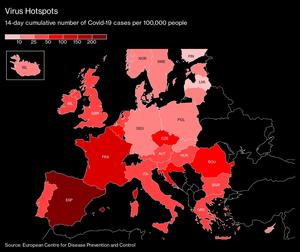
WHO
The Review Committee of the International Health Regulations (IHR) will begin its work on Tuesday to evaluate the functioning of the IHR during the COVID-19 pandemic so far, the chief of the World Health Organization (WHO) said on Monday.
The International Health Regulations is the most important legal instrument in global health security. As a reminder, the review committee will evaluate the functioning of the IHR during the pandemic so far, and recommend any changes it believes are necessary.
Tedros Adhanom Ghebreyesus, WHO director-general
"The International Health Regulations is the most important legal instrument in global health security. As a reminder, the review committee will evaluate the functioning of the IHR during the pandemic so far, and recommend any changes it believes are necessary," said WHO Director-General Tedros Adhanom Ghebreyesus at a virtual press conference.
"It will review the convening of the Emergency Committee, the declaration of a public health emergency of international concern, the role and functioning of national IHR focal points, and will examine progress made in implementing the recommendations of previous International Health Regulations review committees," Tedros said.
Depending on progress made, he said, the committee may present an interim progress report to the resumed World Health Assembly in November, and a final report to the Assembly in May next year.
According to the WHO's website, the review committee is expected to hold its first meeting soon. It is co-chaired by former Prime Minister of New Zealand Helen Clark and former President of Liberia Ellen Johnson Sirleaf. Respiratory disease specialist Zhong Nanshan of China is among its members.
READ MORE: Members named to panel probing WHO's virus response
Global tally
Coronavirus cases worldwide on Monday surpassed 27.2 million while the global death toll topped 890,000, according to the Center for Systems Science and Engineering (CSSE) at Johns Hopkins University.
Africa tally
The number of confirmed COVID-19 cases recorded across the African continent has surpassed 1,299,389 while the death toll reached 31,283, the Africa Centers for Disease Control and Prevention (Africa CDC) said Monday.
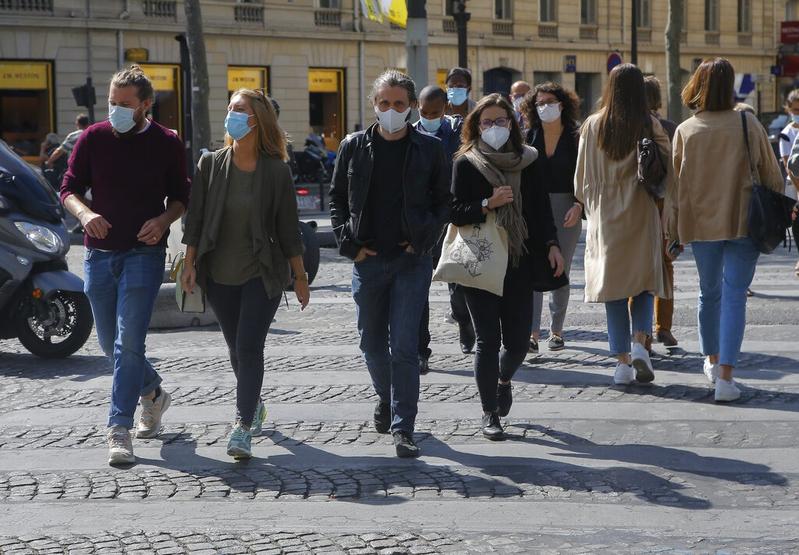 People wearing protective face masks cross the Champs-Elysees avenue in Paris, France, Sept 7, 2020. (MICHEL EULER / AP)
People wearing protective face masks cross the Champs-Elysees avenue in Paris, France, Sept 7, 2020. (MICHEL EULER / AP)
Europe
Europe’s fears of a coronavirus resurgence are becoming reality with France hitting a new peak and infections rising in Germany and the UK after a summer of lax containment.
Earlier lockdowns decimated European economies and authorities are resisting renewed nationwide restrictions on movement. Despite thousands of more cases, the situation is very different than in March and April. Death rates are rising more slowly, and hospitals are still able to treat the sick, easing pressure on European leaders to take drastic action.
Confirmed cases in France rose by more than 4,000 on Monday. The seven-day rolling average has been rising steadily in recent weeks and surpassed 6,000 on Friday, above previous peaks in March and April.
Germany registered almost 1,9000 new infections in the 24 hours through Tuesday morning, the most since April, according to data from Johns Hopkins University.
The UK reported almost 3,000 cases on Monday and case numbers in recent days rose to the highest since May.
The number of COVID-19 deaths in France stayed well below the levels seen at the height of the pandemic five months ago. In Germany, fatalities remained below 10 on most days in the past few weeks, which compares to several hundred daily fatalities in April.
ALSO READ: Europe virus surge looks less deadly than initial wave
The French Health Ministry said the coronavirus was again spreading exponentially, and increased testing doesn’t explain the jump in cases. Authorities say prevention measures have been applied less strictly, particularly by young adults and possibly linked to a resumption of social interaction during the summer.
Algeria
Algeria on Monday reported 289 new COVID-19 cases and six more deaths in the past 24 hours, bringing the total infections to 46,653 and the death toll to 1,562, said the Ministry of Health in a statement.
Another 240 patients were discharged from hospitals, bringing the total number of recoveries to 32,985, with 43 patients still in intensive care units.
Algerian Prime Minister Abdelaziz Djerad said the final date for school reopening would be determined based on COVID-19 data, the official APS news agency reported.
The 2019-2020 school year in Algeria was suspended on March 12 due to the pandemic. On June 15, the Ministry of National Education set Oct 4 the date for the start of the 2020-2021 school year.
Argentina
Argentina's coronavirus death toll surpassed 10,000 on Monday, the government said, as the South American nation struggles to bring its infection rate under control.
There have been 10,129 deaths, with 488,007 confirmed coronavirus cases, according to government data. Almost half of coronavirus tests are yielding a positive result.
The government decided to postpone the National Population, Household and Housing Census scheduled for this year, due to the pandemic.
President Alberto Fernandez signed a decree that gives the National Statistics and Census Institute "up to 60 days after the end of the emergency" to set a new date for the census.
Argentina will hold mid-term legislative elections in the second half of 2021, so the census may be postponed until 2022, so as not to "overlap or hinder the planning and development of voting" nationwide, according to the decree.
Brazil
Brazil recorded 10,273 additional confirmed cases of the novel coronavirus in the past 24 hours, as well as 310 deaths from the disease, the Health Ministry said on Monday.
In all, Brazil has registered 4.15 million cases of the virus since the pandemic began, while the official death toll has risen to 126,960, according to ministry data.
Brazil has the third highest number of coronavirus cases.
Belarus
Belarus reported 177 new COVID-19 cases on Tuesday, taking its total to 73,208, according to the country's health ministry.
There have been 33 new recoveries in the past 24 hours, bringing the total to 71,916, the ministry added.
Canada
Canada reported an average daily number of 545 COVID-19 infections last week, up 25 percent from the previous week which saw a daily average of 435, said the country's Chief Public Health Officer Theresa Tam on Monday.
Overall, in the last week, 3,955 people tested positive for the COVID-19 across Canada while 28 people died.
Tam said in a statement that the steady increase in the number of infections was concerning.
"As we enter the fall, Canadians will need to be even more vigilant about following public health guidance, particularly as the cold weather shifts activities indoors," she said.
In total, Canada has reported 131,895 confirmed cases, including 9,145 deaths, according to the country's Public Health Agency.
Denmark
Denmark is re-introducing a number of coronavirus-related restrictions following the worst spike in infections since the height of the pandemic.
The limit on public gatherings is reduced to 50, from 100, while bars and restaurants will have to shut by midnight, Danish Health Minister Magnus Heunicke said. The announcement follows more than 1,000 new reported cases in the Nordic country over the past week. The new infections appear to affect mostly young people in their 20s, officials said.
Denmark has reported 18,540 confirmed cases and 628 deaths, according to a tally by Johns Hopkins University.
Ecuador
Ecuador on Monday said a total of 110,092 people have tested positive for the COVID-19 since the start of the outbreak here.
According to the Ministry of Public Health, the death toll stood at 10,576 while the number of recoveries stood at 91,242.
The death toll "is the sum" of fatalities confirmed to have been caused by the virus and deaths likely caused by the virus, but lacking scientific confirmation, the ministry said.
Officials decided as of Sunday to combine the two death tolls, which were previously tallied separately.
Egypt
Egypt's total recorded coronavirus cases hit 100,041 on Monday, the health ministry said in a statement.
The total death toll from the disease reached 5,541, with 79,008 recoveries, the health ministry added.
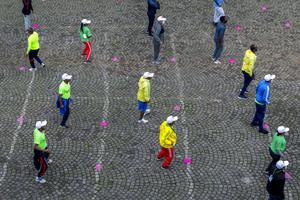 Residents of the Zion apartment complex take part in a socially-distanced exercise session organized by the mayor's office, to allow people to exercise while trying to limit the spread of the coronavirus, in the capital Addis Ababa, Ethiopia, Sept 7, 2020. (MULUGETA AYENE / AP)
Residents of the Zion apartment complex take part in a socially-distanced exercise session organized by the mayor's office, to allow people to exercise while trying to limit the spread of the coronavirus, in the capital Addis Ababa, Ethiopia, Sept 7, 2020. (MULUGETA AYENE / AP)
Ethiopia
Ethiopian Prime Minister Abiy Ahmed commended on Monday the country's increasing COVID-19 testing capacity, as the number of confirmed cases neared 60,000.
The tally hit 59,648 after 976 new cases were registered, the country's Ministry of Health said. It added that 15 more patients had died, raising the death toll to 933.
The country has so far conducted 1,063,454 COVID-19 tests, including 19,449 tests during the last 24-hour period, according to the ministry
"As we pass the 1 million mark, gratitude to all enabled this and caution to all fellow citizens to continue precautionary measures as we engage in upcoming New Year celebrations. 2013 expects the best out of us - let us meet the challenge by keeping healthy," Ahmed said in a statement.
EU
The European Commission said it is close to reaching an agreement with BioNTech SE on the supply of any successful COVID-19 vaccine. “We are almost there,” Sandra Gallina, a senior health official at the commission, the 27-nation European Union’s executive arm, told a European Parliament committee on Monday in Brussels.
Gallina also said the EU expects to receive some doses by the end of the year, citing vaccines being developed by AstraZeneca Plc, Moderna Inc. and BioNTech.
France
French Prime Minister Jean Castex is to undergo a COVID-19 test as a precaution after he shared a car with the director of the Tour de France cycle race, who has since tested positive for the virus, the prime minister’s office said on Tuesday.
Castex followed the route of the Tour de France on Saturday and spent time in a car following the race with tour director Christian Prudhomme. Tour organisers said on Tuesday that Prudhomme had tested positive.
France's COVID-19 situation is "worrying", with daily new cases at record levels, but a second wave of infections is "avoidable", Health Minister Olivier Veran said on Tuesday.
"The reproduction rate of the virus stands at 1.2 which is less than the 3.2-3.4 level seen during the spring. So the virus is spreading at lesser speed but it is circulating, which is worrying", Veran told France Inter radio.
France's tally on Monday rose to 328,980, bringing the increase in infections in the past week to 47,955. The number of deaths also rose by 25 over the last 24 hours to 30,726.
The health ministry said that 537 patients were in intensive care units (ICU), of which the majority were in urban areas such as the Paris/Ile de France region, and the areas around Marseille and Nice.
Germany
Germany’s new virus cases increased at the fastest pace since April as the nation’s public health authority warned that the situation continued to be “dynamic and serious.”
The country registered 1,898 new infections in the 24 hours through Tuesday morning, taking the tally to 253,626, according to data from Johns Hopkins University. There was one fatality, lifting the death toll to 9,331.
According to data from the Robert Koch Institute (RKI) for infectious diseases, the number of infections increased by 1,499 to 252,298 while the toll rose by four to 9,329.
The country’s reproduction factor rose to 1.12 on Monday from 1.10 the day before, according to the latest estimate from the RKI.
Despite the recent uptick in infections, the public health service has ensured that Germany has kept the pandemic “largely under control,” and hopefully can continue to do so, Chancellor Angela Merkel said Tuesday during a conference with regional and municipal health officials.
The RKI noted that outbreaks continued to occur throughout the country, particularly in connection with celebrations with family and friends and at group events.
Greece
Greece has registered at least 17 cases of coronavirus infection in the overcrowded migrant camp of Moria on the island of Lesbos so far, a migration ministry official said on Monday.
Last week, the facility was placed under quarantine after authorities confirmed that a 40-year-old asylum-seeker had tested positive for the coronavirus.
So far, 1,600 tests have been conducted in Moria, Migration Minister Notis Mitarachi told Alpha TV.
Late on Monday, Greek authorities said that three more migrant facilities had been quarantined: the Eleonas camp in Athens, the Malakasa camp just north of Athens and the facility in Schisto, near the port of Pireaus.
Greece has recently seen a surge in coronavirus cases. It has recorded 11,524 cases and 284 COVID-related deaths.
Ireland
Ireland is likely to authorize the reopening of more than half the country's pubs which do not serve food on Sept 21 after health officials advised they should not open before that date, the Irish Times reported on Tuesday.
The cabinet is expected to agree to the reopening date at a meeting on Tuesday, the paper said. National broadcaster RTE reported that cabinet would discuss a range of dates, also including Sept 14 and Sept 28.
Data on Monday showed that Ireland's average number of cases has continued to rise slowly over the past week and is at a higher level than when the government significantly tightened nationwide coronavirus restrictions last month.
The country's chief medical officer warned residents of Dublin and Limerick on Monday to limit their social interactions as much as possible to control concerning spikes in cases in two of Ireland's largest cities. Dublin accounted for 56 of 102 new cases reported Monday.
In total, Ireland has so far reported 29,774 confirmed cases, with 1,777 deaths, according to Johns Hopkins University data.
Italy
The number of new COVID-19 cases in Italy dropped slightly on Monday, as current anti-COVID measures are set to be extended until the end of this month.
The country's total confirmed cases reached 278,784, after 1,108 cases were added over the last 24 hours, official statistics from the Health Ministry showed.
Some 32,993 were active infections, up from the 915 cases on Sunday, while the death toll rose by 12 to 35,553.
Prime Minister Giuseppe Conte was expected to sign a new decree late on Monday in order to extend the main anti-COVID measures in the country until Sept 30.
Also on Monday, doctors at the San Raffaele hospital in northern Milan said the health conditions of former Prime Minister Silvio Berlusconi, 83, were getting better. Berlusconi had been admitted to the hospital late Thursday after being tested positive for the coronavirus.
Malawi
Schools reopened in Malawi on Monday under strict COVID-19 preventive measures, five months after the government ordered the closure of schools in the wake of the pandemic.
President Lazarus Chakwera had ordered that examination classes such as Standard 8 in primary school and Form 4 in secondary school should reopen first, together with colleges and universities where students were about to write exams.
Following the president's order, Minister of Education, Science and Technology Agnes Nyalonje announced late August that the exam classes would reopen on Sept 7 while the rest would reopen later in the months of September and October under close monitoring of the COVID-19 trends.
COVID-19 prevalence in Malawi is generally decreasing with only 3 new cases recorded Sunday, bringing the total number of infections to 5,614.
The death toll remained at 175 as of Sunday while 3,551 recoveries had been recorded so far.
Mexico
Mexico reported 3,486 newly confirmed cases of coronavirus infection and 223 additional fatalities on Monday, bringing its totals to 637,509 infections and 67,781 deaths, according to updated health ministry data.
Morocco
Morocco announced on Monday 1,386 new COVID-19 infections, taking the tally to 73,780.
The number of recoveries increased by 822 to 56,096 while the death toll rose by 33 to 1,394, the Ministry of Health said in a statement.
A new lockdown was imposed in Casablanca, the North African country's economic hub, after a huge increase in infections during the last days.
The government also announced the closure of all schools and universities in the city for at least two weeks with the adoption of distance education.
Netherlands
The number of new coronavirus infections in the Netherlands jumped 51% last week to their highest level since the end of April, Dutch health authorities said on Tuesday.
Newly confirmed infections increased to 5,427 in the week to Tuesday, up from 3,597 in the previous week, while the total number of tests rose 10 percent to little over 180,000.
Coronavirus cases in the Netherlands had been stable at about 3,500 per week in recent weeks, after the easing of lockdown measures in July was followed by a steady rise to over 4,000 in early August.
The largest increase of infections last week was among people aged 20 to 24, the health authorities said, while most of the newly infected were found to have contracted the virus at home.
The new rise coincided with the reopening of schools throughout the country, but health authorities said they had not found a significant increase of cases related to schools.
Infections known to have occurred at schools were mainly among adults, they said.
The total number of confirmed coronavirus cases in the Netherlands rose to 76,548, with 6,244 deaths.
Nigeria
Nigerian resident doctors began their second strike of the year over pay and working conditions amid the spread of the new coronavirus, the doctors’ union told Reuters on Tuesday.
The strike began on Monday, and includes 16,000 resident doctors out of a total of 42,000 doctors in the country, Dr Aliyu Sokomba, President of the National Association of Resident Doctors, told Reuters.
Nigeria, Africa’s most populous nation, has a total of 55,160 confirmed coronavirus infections and 1,061 deaths.
Resident doctors are medical school graduates training as specialists. They are pivotal to frontline healthcare in Nigeria as they dominate the emergency wards in its hospitals.
The group last went on strike in June, demanding better benefits and more protective equipment for battling the coronavirus. They are still demanding, among other things, life insurance and hazard allowance.
In a statement, Minister of Labour Chris Ngige called on the doctors to suspend the strike.
Spain
Spain's Foreign Minister Arancha Gonzalez Laya said on Tuesday her government was pushing for a European Union (EU) harmonization of COVID-19 travel measures to limit problems for tourists and tourism operators.
Spain became the first country in Western Europe to register 500,000 coronavirus infections after a second surge in cases that coincided with schools reopening
The Spanish government is also discussing with Britain and the EU to take into account indicators other than just the number of cases to make decisions on imposing quarantines on travellers such as the number of tests, the number of symptomatic cases and the number of hospitalized patients, Gonzalez Laya said in an interview with RNE radio station.
Spain is hoping a more flexible British quarantine police will make it possible to save some of the winter season in the Canary Islands, she said.
Spain became the first country in Western Europe to register 500,000 coronavirus infections on Monday, after a second surge in cases that coincided with schools reopening.
Health Ministry data showed a total of 525,549 cases, up from 498,989 on Friday, and 2,440 infections registered in the last 24 hours. Another eight more deaths were reported, bringing the toll to 29,516.
The milestone came as schools reopened in six regions including the Basque Country on Monday, while others will resume classes over the next 10 days.
In an attempt to contain the outbreak, the government of Madrid imposed an order to limit social gathering in public and private spaces to no more than 10 people. The region has for days recorded Spain’s highest infection rates.
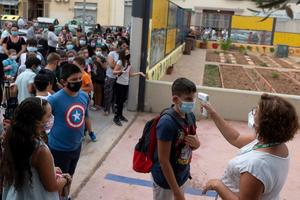 A teacher checks the temperature of a student arriving to a municipal school on the first day of classes for the new academic year in Valencia, Spain, on Sept 7, 2020, amid the coronavirus pandemic. (JOSE JORDAN / AFP)
A teacher checks the temperature of a student arriving to a municipal school on the first day of classes for the new academic year in Valencia, Spain, on Sept 7, 2020, amid the coronavirus pandemic. (JOSE JORDAN / AFP)
Uganda
Uganda's Ministry of Health has converted parts of Namboole National Stadium into an auxiliary hospital to cater for the rapidly increasing number of COVID-19 cases in the east African country.
Diana Atwine, the ministry's permanent secretary, said the facility has a 1,500-bed capacity. She said asymptomatic and mild cases would be admitted at the facility, while the severe ones will remain at the regional and national referral hospitals.
The conversion of the stadium into a treatment facility came after a spike of COVID-19 cases in the country, especially in the capital, Kampala, which is becoming the epicenter of the virus.
As of Sunday, Uganda had reported 3,667 COVID-19 cases, including 1,608 recoveries and 41 deaths, according to data from the ministry.
UK
British Housing Minister Robert Jenrick said Tuesday that a rise in the number of COVID-19 cases in the country was concerning and he called on people to follow health guidance or risk tougher restrictions in the coming months.
The remarks echoed those of England's deputy chief medical officer, who said Monday that the spike was of great concern and people had "relaxed too much" over the summer. Warning people they would need to follow the guidelines, Jonathan Van-Tam said: "We have got to start taking this very seriously again".
The United Kingdom recorded 2,948 daily confirmed cases of COVID-19, according to government data published on Monday, the second biggest 24-hour rise since May. The fresh infections pushed the tally to 350,100, according to government data.
READ MORE: Competing pressures build on UK's Johnson as virus surges
A new experimental COVID-19 vaccine originating from the University of Oxford has begun human trials in Australia in partnership with the Serum Institute of India, the world’s largest vaccine manufacturer. The shot, devised by SpyBiotech, has begun going into volunteers in a phase I/II trial in Australia run by the Serum Institute, which will eventually enroll several hundred participants, said Sumi Biswas, the company’s chief executive officer and a professor at Oxford’s Nuffield Department of Medicine.
On Monday, Health Secretary Matt Hancock claimed a coronavirus vaccine is "most likely" to be ready in the first few months of 2021, if it gets approved. He said it was "looking up" that the vaccine being developed by experts at the University of Oxford and pharmaceutical giant AstraZeneca would be granted approval for use soon after trials in several countries, including Britain, the United States and Brazil, the Evening Standard newspaper reported.
Ukraine
Ukraine registered a record 57 deaths related to the new coronavirus in the past 24 hours, the national security council said on Tuesday, up from a previous record of 54 deaths registered last week.
The council said a total of 140,479 cases were registered in Ukraine as of Sept 8, with 2,934 deaths and 63,546 people recovered.
US
US President Donald Trump said at a White House briefing Monday that vaccine may be ready in October. Meanwhile, Democratic presidential nominee Joe Biden said he would heed the advice of scientists about whether to get a vaccine if one were to become available before November’s presidential election.
The Republican-led US Senate will move to take up their proposed COVID-19 relief legislation and vote as soon as this week, Senate Majority Leader Mitch McConnell said in a statement on Tuesday.
Many public health officials and scientists have expressed concerns that the FDA is under pressure from the White House to approve a vaccine before Trump faces re-election on Nov 3. Americans may be unwilling to receive a shot if they believe it was rushed to market based on the campaign timetable.
FDA leaders are insulating the agency’s vaccine reviewers from outside political pressure by establishing safeguards that set the standard for what it will take for a vaccine to pass through the agency, said one official familiar with the planning, who asked for anonymity discussing private deliberations.
They’re also making clear to FDA staff that the political noise shouldn’t influence the agency’s decisions. FDA Commissioner Stephen Hahn last week sent an email to all 17,000 staff, promising that the agency would adhere to the science in a vaccine review.
So far, the US has reported over 6.3 million confirmed cases and more than 189,000 deaths, according to a tally by Johns Hopkins University.
On college outbreaks, about 100 college communities have seen a high rate of infection in recent weeks as students have returned for the fall semester, making the campuses and the surrounding community a new front of the pandemic in the US, according to an article published by The New York Times on Sunday.
Epidemiologists have warned that, even with exceptional contact tracing, it would be difficult to completely contain the virus on a campus when students shop, eat and drink in town, and local residents work at the college, according to the article.
Zimbabwe
The Zimbabwean government has relaxed COVID-19 regulations on inbound human traffic, with those testing negative 48 hours before their return being allowed to self-quarantine at home.
The new measures, which became effective last Friday, also allow those without certificates to go home if they test negative at quarantine centers, Information Minister Monica Mutsvangwa said.
The government-controlled Herald newspaper reported Tuesday that Mutsvangwa made the remarks as she gave feedback on proceedings of Monday's COVID-19 taskforce meeting.
It was noted that there are now more local infections among clusters within communities, as compared to the past when most of the cases were imported
As of Monday, the country had recorded 7,298 cases, 210 deaths, and a national recovery rate of 75 percent. ‘’


